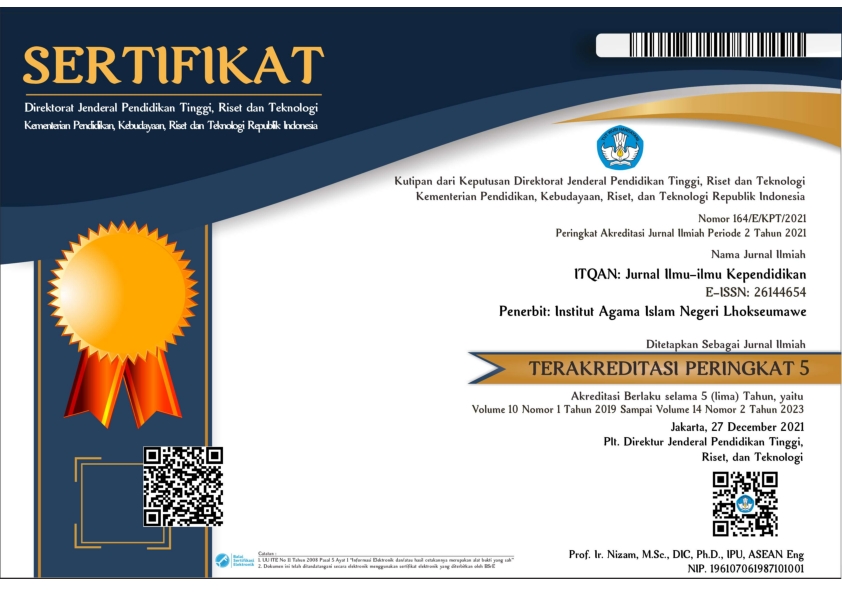Implementation of Project Based Learning in Improving Early Childhood Interpersonal Intelligence
Main Article Content
Tri Endah Puspitasari
Robingatin Robingatin
Akhmad Muadin
This research study investigates the implementation of Project Based Learning (PBL) to enhance early childhood interpersonal intelligence. The study explores the steps involved in planning PBL and presents specific strategies for its implementation in early childhood settings. This study used a qualitative approach with data collection techniques in the form of semi-structured interviews, non-participant observation, and documentation. Data analysis used Milles, Huberman, and Saldana's interactive data analysis, namely: data condensation, data display, and conclusion. The research findings show that the implementation of PBL has a positive impact on students' interpersonal intelligence by promoting interaction, collaboration, and problem-solving skills. Strategies such as the division of diverse groups, assigning different roles, encouraging group discussions, providing peer feedback, and facilitating reflection, and evaluation were found to be effective in fostering interpersonal skills. Evaluation of PBL implementation involved formative and summative assessments, which allowed observation of student participation, feedback on interpersonal skills, assessment of project outcomes, and collecting feedback from students, parents, and teachers. The comprehensive evaluation process supports the effectiveness of PBL in improving early childhood interpersonal intelligence. The implications of this study highlight the importance of incorporating established educational theories and research findings into PBL planning, strengthening the theoretical foundation, and providing evidence-based support for the effectiveness of PBL in fostering early childhood interpersonal intelligence. The findings contribute to the field of early childhood education by providing practical guidance for educators who want to improve students' interpersonal skills through a project-based learning approach.
Afifah, N. (2017). Problematika pendidikan di Indonesia (Telaah dari aspek pembelajaran). Elementary: Jurnal Iilmiah Pendidikan Dasar, 1(1), 41–74.
Aguayo, B. B., Ruano, C. A., & Vallejo, A. P. (2021). Multiple Intelligences: Educational and Cognitive Development with a Guiding Focus. South African Journal of Education, 41(2), 1–10.
Feng, H., & Wang, D. (2019). Teaching Evaluation Based on Project Learning. 2019 9th International Conference on Social Science and Education Research (SSER 2019) Recuperado de Https://Webofproceedings. Org/Proceedings_series/ESSP/SSER, 202019.
Frey, B. B., & Schmitt, V. L. (2007). Coming to Terms With Classroom Assessment. Journal of Advanced Academics, 18(3), 402–423. https://doi.org/10.4219/jaa-2007-495.
Hung, W. (2015). Problem-Based Learning: Conception, Practice, and Future. Authentic Problem Solving and Learning in the 21st Century: Perspectives from Singapore and Beyond, 75–92. https://doi.org/10.1007/978-981-287-521-1_5.
Khairi, H. (2018). Karakteristik Perkembangan Anak Usia Dini dari 0-6 Tahun. Jurnal Warna, 2(2), 15–28.
Miles, M.B, Huberman, A.M, dan S. J. (2014). Qualitative Data Analysis: A Methods Sourcebook (3rd ed.). Sage Publications.
Muadin, A. (2017a). Nilai-nilai dalam Pendidikan Islam Menuju Paradigma Pembelajaran Qur'ani. Jurnal Pedagogik, 04(02).
Muadin, A. (2017b). Manajemen Pemasaran Pendidikan Pondok Pesantren Tahfidz Qur’an. Ta’allum: Jurnal Pendidikan Islam, 5(2). https://doi.org/10.21274/taalum.2017.5.2.293-308.
Nicol, D. J., & Macfarlane‐Dick, D. (2006). Formative Assessment and Self‐Regulated Learning: A Model and Seven Principles of Good Feedback Practice. Studies in Higher Education, 31(2), 199–218. https://doi.org/10.1080/03075070600572090.
Nisfa, N. L., Latiana, L., Pranoto, Y. K. S., & Diana, D. (2022). Pengaruh Pendekatan Pembelajaran Project Based Learning (PjBL) Terhadap Kemampuan Sosial dan Emosi Anak. Jurnal Obsesi : Jurnal Pendidikan Anak Usia Dini, 6(6), 5982–5995. https://doi.org/10.31004/obsesi.v6i6.3032.
Nurhadi, N. (2018). Multiple Intelligences Anak Usia Dini Menurut Al-Qur’an Surat Luqman Ayat 12-19 (Kajian Filsafat Pendidikan). Generasi Emas, 1(2), 144. https://doi.org/10.25299/ge.2018.vol1(2).2568.
Nurunnisa, E. C. (2017). Melek Kecerdasan Interpersonal Anak Usia Dini. Tunas Siliwangi, 2(2), 10–17.
Oviyanti, F. (2016). Peran Organisasi Kemahasiswaan Intrakampus dalam Mengembangkan Kecerdasan Interpersonal Mahasiswa. El-Idare: Jurnal Manajemen Pendidikan Islam, 2(1), 61–79.
Qowiyah, S. H. (2020). Analisis Kecerdasan Interpersonal Anak Kelompok B. Cakrawala Dini: Jurnal Pendidikan Anak Usia Dini, 11(2), 96–101. https://doi.org/10.17509/cd.v11i2.26239.
Rifa’i, M., Muadin, A., Faiz, F., Khomsiyah, L., & Mabruroh, A. (2022). Menciptakan Pembelajaran Efektif melalui Penguatan Komitmen Guru PAUD. Jurnal Obsesi : Jurnal Pendidikan Anak Usia Dini, 6(4), 3739–3746. https://doi.org/10.31004/obsesi.v6i4.2122.
Roessingh, H., & Chambers, W. (2011). Project-Based Learning and Pedagogy in Teacher Preparation: Staking Out the Theoretical Mid-Ground. International Journal of Teaching and Learning in Higher Education, 23(1), 60–71.
Rogoff, B., Callanan, M., Gutiérrez, K. D., & Erickson, F. (2016). The Organization of Informal Learning. Review of Research in Education, 40(1), 356–401. https://doi.org/10.3102/0091732X16680994.
Sahidun, N. (2018). Kecerdasan Interpersonal Anak Usia Dini melalui Permainan Tradisional. Journal of Early Childhood Care & Education, 1(1), 13–17.
Salabi, A. S. (2021). Pendidikan Karakter Berbasis Gender: Studi Kasus di Taman Kanak-Kanak Putroe Nahrisyah Lhokseumawe. Saree: Research in Gender Studies, 3(2), 219–228. https://doi.org/https://doi.org/10.47766/saree.v3i2.625.
Sari, A. Y. (2018). Implementasi Pembelajaran Project Based Learning Untuk Anak Usia Dini. Motoric, 1(1), 10. https://doi.org/10.31090/paudmotoric.v1i1.547.
Sari, A. Y., & Astuti, R. D. (2018). Implementasi Pembelajaran Project Based Learning Untuk Anak Usia Dini. Paud Motoric, 1(1), 1–13. https://doi.org/10.31090/paudmotoric.v1i1.547.
Tomlinson, C. A. (2015). Teaching for Excellence in Academically Diverse Classrooms. Society, 52(3), 203–209. https://doi.org/10.1007/s12115-015-9888-0.
Waldron, N. L., & McLeskey, J. (2010). Establishing a Collaborative School Culture Through Comprehensive School Reform. Journal of Educational and Psychological Consultation, 20(1), 58–74. https://doi.org/10.1080/10474410903535364.
Yeung, S. (2010). Problem-Based Learning for Promoting Student Learning in High School Geography. Journal of Geography, 109(5), 190–200. https://doi.org/10.1080/00221341.2010.501112.




